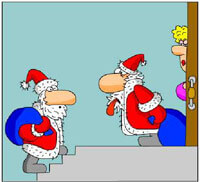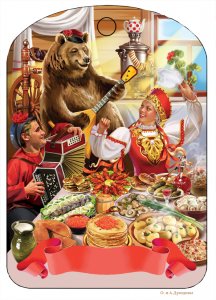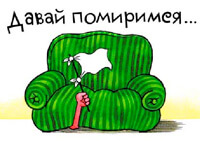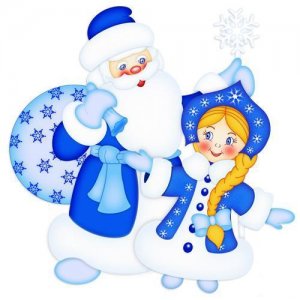Defender Day – February 23
 Defender of Fatherland Day is a day off.
Defender of Fatherland Day is a day off.Epiphany – January 19
 A period from Christmas (January 6) to Epiphany (January 19) is called Svyatki (Christmastide).
A period from Christmas (January 6) to Epiphany (January 19) is called Svyatki (Christmastide).Russian Old New Year – January 13
 As the Russian Orthodox Church follows the Julian calendar, many Russian Orthodox holidays fall 12 days later than Western Christian holidays.
As the Russian Orthodox Church follows the Julian calendar, many Russian Orthodox holidays fall 12 days later than Western Christian holidays.Christmas – January 7

The celebration somewhat reminds Halloween. Children go from house to house wearing costumes, singing Christmas carols, and collecting gifts for their performances.
Christmas is a family holiday, so traditionally members of the family gather on Christmas Eve to share a special meal. Religious people fast for 39 days prior to this day and start their Christmas supper with a special meal, called Kutiya, which is a sweet soupy dish made from wheat, dried fruit, nuts, and honey. After the Kutiya the Holy Supper begins – a vegetarian meal that consists of 12 different dishes that represent 12 Apostles. After the supper, the family goes to church.
The Orthodox church has a big Christmas service on this day that lasts until 2 in the morning. The ceremony is shown on TV, and Russian leading politicians, including the president, attend the service.
New Year – December 31
How Russians are celebrating New Year
January 1 – New Year – is the first in the calendar and the most favorite holiday in Russia. Everybody celebrates it. It is bigger than Christmas. This is the time to make wishes and give presents to friends and relatives.
Children find their presents under the Christmas tree, which Grandfather Frost (Russian Santa Clause) put on New Year’s Eve. During a week before December 31st kids at kindergartens and Elementary schools have New Year’s parties, where they meet Grandfather Frost and his granddaughter Snow maiden.
Adults gather in big groups and celebrate New Year with delicious meals, fireworks, and a lot of noise. There is another tradition – shortly before 12 PM, everybody stands with a glass of campaign and listens to the New Year’s Speech by the President of Russia. When the Big Kremlin Chimes struck midnight, everybody is supposed to make a wish. Then people clink their glasses, say ‘Happy New Year!’, kiss each other and the party continues till 4, 5, 6… in the morning.
Partying

You’ll definitely want to dress up for a party with Russians. Men wear suits and ties. And women…. generally Russian women care greatly about their appearance. They are stylish and never leave a house wearing rumpled or stained clothes. (The neighbors are watching!) For a party, they may dress quite provocatively to a foreign eye, but it does not mean anything bad. High heels, makeup, nice looking hair, jewelry – everything should match.
We should mention the drinking part. Yes, Russians drink vodka at their parties, and they prefer not to mix drinks. Women mostly drink wine or champagne. Usually, the bottles are delivered to your table, and there is one man in charge who makes sure that there are no empty glasses on the table. Each drink should be toasted, and everybody is expected to say a toast.


